Related Research Articles
Racial profiling or ethnic profiling is the act of suspecting, targeting or discriminating against a person on the basis of their ethnicity, religion, or nationality, rather than on individual suspicion or available evidence. Racial profiling involves discrimination against minority populations and often builds on negative stereotypes of the targeted demographic. Racial profiling can involve disproportionate stop searches, traffic stops, and the use of surveillance technology for facial identification.
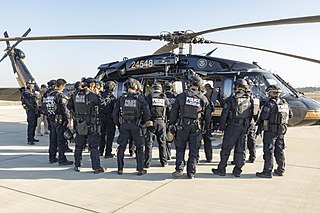
In the United States, a SWAT team is a generic term for a police tactical unit.
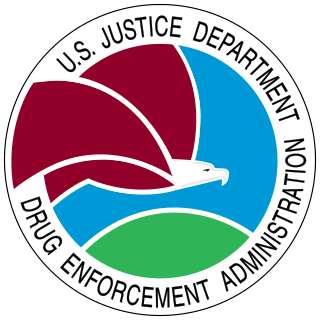
The Drug Enforcement Administration (DEA) is a United States federal law enforcement agency under the U.S. Department of Justice tasked with combating illicit drug trafficking and distribution within the U.S. It is the lead agency for domestic enforcement of the Controlled Substances Act, sharing concurrent jurisdiction with the Federal Bureau of Investigation, the U.S. Immigration and Customs Enforcement, and U.S. Customs and Border Protection. However, the DEA has sole responsibility for coordinating and pursuing U.S. drug investigations both domestically and internationally.

The war on drugs is the policy of a global campaign, led by the United States federal government, of drug prohibition, military aid, and military intervention, with the aim of reducing the illegal drug trade in the United States. The initiative includes a set of drug policies that are intended to discourage the production, distribution, and consumption of psychoactive drugs that the participating governments, through United Nations treaties, have made illegal.
"Driving while black" (DWB) is a sardonic description of racial profiling of African-American motor vehicle drivers. It implies that a motorist may be stopped by a police officer largely because of racial bias rather than any apparent violation of traffic law. It is a word play of "driving while intoxicated."
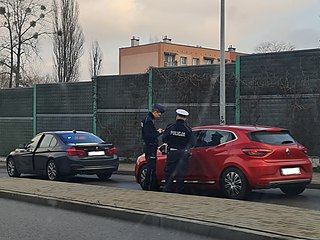
A traffic stop, colloquially referred to as being pulled over, is a temporary detention of a driver of a vehicle and its occupants by police to investigate a possible crime or minor violation of law.
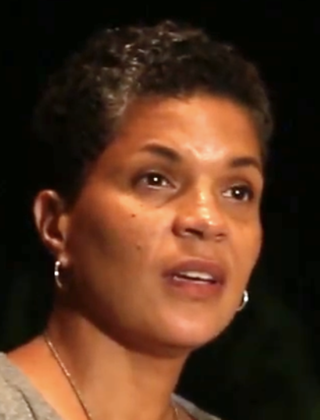
Michelle Alexander is an American writer, attorney, and civil rights activist. She is best known for her 2010 book The New Jim Crow: Mass Incarceration in the Age of Colorblindness. Since 2018, she has been an opinion columnist for The New York Times.

The Campaign Against Marijuana Planting (CAMP) is a multi-agency law enforcement task force managed by the California Department of Justice and composed of local, state and federal agencies organized expressly to eradicate illegal cannabis cultivation and trafficking in California. Since its establishment in 1983, more than 110 agencies having participated, making CAMP one of the largest law enforcement task force in the United States.
The Law Enforcement Action Partnership (LEAP), formerly Law Enforcement Against Prohibition, is a U.S.-based nonprofit organization group of current and former police, judges, prosecutors, and other criminal justice professionals who use their expertise to advance drug policy and criminal justice solutions that enhance public safety. The organization is modeled after Vietnam Veterans Against the War. As of April 2017, they have more than 180 representatives around the world who speak on behalf of over 5,000 law enforcement members and 100,000 supporters.

As of 2020, more than 800,000 sworn law enforcement officers have been serving in the United States. About 137,000 of those officers work for federal law enforcement agencies.
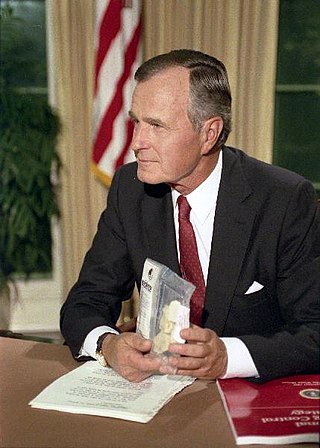
The crack epidemic was a surge of crack cocaine use in major cities across the United States throughout the entirety of the 1980s and the early 1990s. This resulted in a number of social consequences, such as increasing crime and violence in American inner city neighborhoods, a resulting backlash in the form of tough on crime policies, a massive spike in incarceration rates, and a sharp escalation of the war on drugs.
The Guadalajara Cartel also known as The Federation was a Mexican drug cartel which was formed in 1980 by Miguel Ángel Félix Gallardo, Rafael Caro Quintero, and Ernesto Fonseca Carrillo in order to ship cocaine and marijuana to the United States. Among the first of the Mexican drug trafficking groups to work with the Colombian cocaine mafias, the Guadalajara Cartel prospered from the cocaine trade. Throughout the 1980s, the cartel controlled much of the drug trafficking in Mexico and the corridors along the Mexico–United States border. It had operations in various regions in Mexico which included the states of Jalisco, Baja California, Colima, Sonora, Chihuahua and Sinaloa among others. Multiple modern present day drug cartels such as the Tijuana, Juárez and Sinaloa cartels originally started out as branches or "plazas" of the Guadalajara Cartel before its eventual disintegration.
The War on Drugs is a term for the actions taken and legislation enacted by the US federal government, intended to reduce or eliminate the production, distribution, and use of illicit drugs. The War on Drugs began during the Nixon administration with the goal of reducing the supply of and demand for illegal drugs, but an ulterior racial motivation has been proposed. The War on Drugs has led to controversial legislation and policies, including mandatory minimum penalties and stop-and-frisk searches, which have been suggested to be carried out disproportionately against minorities. The effects of the War on Drugs are contentious, with some suggesting that it has created racial disparities in arrests, prosecutions, imprisonment, and rehabilitation. Others have criticized the methodology and the conclusions of such studies. In addition to disparities in enforcement, some claim that the collateral effects of the War on Drugs have established forms of structural violence, especially for minority communities.
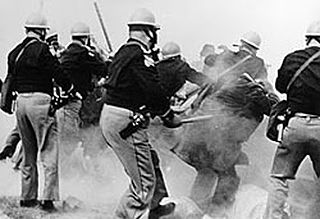
Police brutality is the use of excessive or unnecessary force by personnel affiliated with law enforcement duties when dealing with suspects and civilians.
African Americans, and African American males in particular, have an ethnic stereotype in which they are portrayed as dangerous criminals. This stereotype is associated with the fact that African Americans are proportionally over-represented in the numbers of those that are arrested and convicted for committing crimes. It has appeared frequently in American popular culture, reinforcing the negative consequences of systemic racism.

The New Jim Crow: Mass Incarceration in the Age of Colorblindness is a book by Michelle Alexander, a civil rights litigator and legal scholar. The book discusses race-related issues specific to African-American males and mass incarceration in the United States, but Alexander noted that the discrimination faced by African-American males is prevalent among other minorities and socio-economically disadvantaged populations. Alexander's central premise, from which the book derives its title, is that "mass incarceration is, metaphorically, the New Jim Crow".
The Night Train drug seizure was a December 1977 seizure of 54 tons of marijuana by the United States Coast Guard off the southeastern coast of Florida which marked the beginning of Operation Stopgap, a United States federal law enforcement inter-agency drug interdiction operation focusing on interdicting drugs from Colombian cartels and other illicit Central and South American drug sources. The Night Train seizure was the largest single drug seizure in history at the time it occurred, and it remains one of the largest marijuana seizures made in the territorial waters of the United States.
Racial profiling by law enforcement at the local, state, and federal levels, leads to discrimination against people in the African American, Native American, Asian, Pacific Islander, Latino, Arab, and Muslim communities of the United States. Examples of racial profiling are the use of race to determine which drivers to stop for minor traffic violations, or the use of race to determine which pedestrians to search for illegal contraband. Besides such disproportionate searching of African Americans and members of other minority groups, other examples of racial profiling by law enforcement in the U.S. include the Trump-era China Initiative following racial profiling against Chinese American scientists; the targeting of Hispanic and Latino Americans in the investigation of illegal immigration; and the focus on Middle Eastern and South Asians present in the country in screenings for ties to Islamic terrorism. These suspicions may be held on the basis of belief that members of a target racial group commit crimes at a higher rate than that of other racial groups.
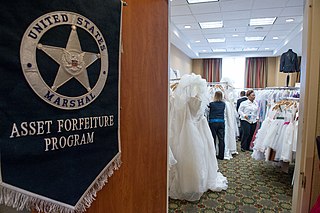
In the United States, civil forfeiture is a process in which law enforcement officers take assets from people who are suspected of involvement with crime or illegal activity without necessarily charging the owners with wrongdoing. While civil procedure, as opposed to criminal procedure, generally involves a dispute between two private citizens, civil forfeiture involves a dispute between law enforcement and property such as a pile of cash or a house or a boat, such that the thing is suspected of being involved in a crime. To get back the seized property, owners must prove it was not involved in criminal activity. Sometimes it can mean a threat to seize property as well as the act of seizure itself. Civil forfeiture is not considered to be an example of a criminal justice financial obligation.

Criminal justice reform seeks to address structural issues in criminal justice systems such as racial profiling, police brutality, overcriminalization, mass incarceration, and recidivism. Reforms can take place at any point where the criminal justice system intervenes in citizens’ lives, including lawmaking, policing, sentencing and incarceration. Criminal justice reform can also address the collateral consequences of conviction, including disenfranchisement or lack of access to housing or employment, that may restrict the rights of individuals with criminal records.
References
- 1 2 Kocieniewski, David (2000-11-29). "New Jersey Argues That the U.S. Wrote the Book on Race Profiling". The New York Times. ISSN 0362-4331 . Retrieved 2023-11-21.
- 1 2 "Driving While Black: Racial Profiling On Our Nation's Highways". American Civil Liberties Union. Retrieved 2023-11-21.
- ↑ "Operation Pipeline Training Course". United States Drug Enforcement Agency. September 10, 2019.
- ↑ Alexander, Michelle (2020-01-07). The New Jim Crow: Mass Incarceration in the Age of Colorblindness. The New Press. p. 89. ISBN 978-1-62097-194-9.
- ↑ Owusu-Bempah, Akwasi; Anthony Morgan (July 16, 2016). "A hard truth: Canada's policing style is very similar to the U.S." The Globe and Mail . Retrieved 2016-07-18.